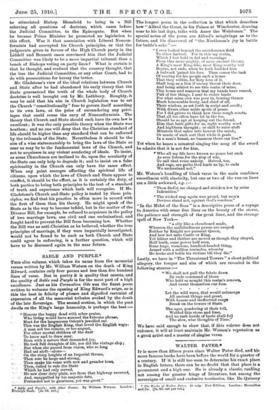SABLE AND PITRPLE.*
Eveleigh Nash. 122. 6d. not.] and co.. net per vol.) THIS slim volume, which takes its name from the memorial verses written by Mr. William Watson on the death of King Edward, contains only four poems and leas than five hundred lines of verse. But in poetry it is quality that counts, and the quality of SaWe and Purple is for the most part of a high excellence. Just as his Coronation Ode was the finest poem written to weloome the opening of King Edward's reign, so is this the best in felicity of phrase and dignified restraint of expression of all the memorial tributes evoked by the death of the late Sovereign. The second section, in which the poet dwell§ on the King's large humanity, is perhaps the best " Honour the happy dead with sober praise,
Who living would have scorned the fulsome phrase, Meet for the languorous Orient's jewelled ear.
This was the English King, that loved the F•pgliatt Wayti:
Amen not too remote, or toe august, For other mortal children of the dust-
'Do know and to draw near..
Born with &nature that demanded joy,
Hb took full draughts Of life, nor did the vintage clog;
But when she passed from vision, who so long
Had sat aloft—alone- On the steep heights of an Imperial throne,
Then rote he large and strong, When spade his voice with new and grander tone, Then, called to rule the State Which be had only served, He so.* Clear duty plain, nor from that highway swery
And, =appalled by his majestic fate, •
Pretended not to greatness, yet was great." The longest poem in the collection is that which describes how "Alfred the Great, in his Palace at Winchester, drawing near to his last days, talks with Asser the Welshman." The special notes of the poem are Alfred's misgivings as to the future, and his disavowal of "the Northman's joy in battle for battle's sake "
:- "I ever looked beyond the sword-mown field
To other harvest. For in this my realm,
Which I but hold in fief and vassalage
From One more mighty, of more ancient throne,
A King's most King-like, most King-worthy toil Begins, not ends, when he bath builded him
A bulwark 'gainst his foes. Then comes the task Of rearing for his people such a house That they within, for fiery love of it, Shall leap as a lion if enemy throat their door. And being athirst to see this realm of mine,
This house and mansion that my hands have reared,
Full of fair things, I sent to richer lands For what mine own was poor in, bearing thence Much honourable booty, and chief of all, Their wisdom, as set forth in script and scroll With divers other noble spoils of peace.
For I did grieve to think how these rough coasts,
That all too often have let in the foe, Should be so apt at keeping out the friend, Him that bath gifts for us, right worthy word
And highborn thought ; or skill to raise aloft
Minsters that usher into heaven the mind Or music of such sort that while it peals
In a man's breast, no baseness there can live."
Yet when he hears a minstrel singing the song of the sword he admits that it is not for him,
* Who all my life have known no peace but such As ever listens for the step of war,
To call that voice unholy. Hatred, too,
And rage, are paths God leads us by, to ends We understand not."
Mr. Watson's handling of blank verse in the innin combines smoothness with elasticity, but one or two of the run-on lines are a little awkward, e.g. :— " Thon find'st me changed and stricken low by mine Infirmities."
"The wicked may again wax proud, but men's Devices stand not, against Clod's resolves."
"Ill the Midst of the Seas" is a descriptive poem of a voyage to America with some fine lines on the beauty of the storm, the patience and strength of the great liner, and the strange spell of New York- " a city like a chessboard made, Whereon the multitudinous pawns are swayed Neither by Knight nor puissant Queen, And bow not unto Castle or King, Yet hither and thither are moved as though they obeyed, Half loath, some power half seen Some huge, voracious, hundred-headed thing, Armed with a million tentacles, whereby He books and holds his victims till they die."
Lastly, we have in "The Threatened Towers" a short political allegory, the temper and aim of which are revealed in the following stanzas :—
4 We shall not pull the fabric down By rude command of those
Who hold as nought this realm's renown, And vaunt themselves.' our foes.
Let the wild wave, that would submerge All ancient things and great, With hoarse and ineffectual surge Break on the towers of State.
The ages, pondering at their toil, Welded this SODA and lime, And np rash bands of haste shall foil The slow, wise thoughts of Time."
We have said enough to show that, if this volume does riot enhance, it will at least maintain 3dr. Watson's reputation as a. Mat ffitist and a master of elegiac verse.






















































 Previous page
Previous page